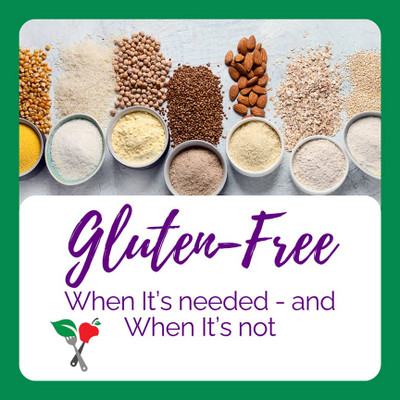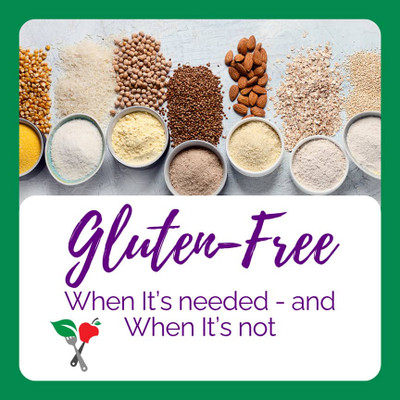The Gluten Free Diet - Is it Healthy?
As a Registered Dietitian Nutritionist, one of the most common questions I hear is: Should I go gluten-free? The answer depends entirely on your individual health needs. For people with celiac disease or a non-celiac gluten sensitivity, avoiding gluten is not a choice, it's a necessity. For everyone else, the picture is more nuanced.
What Is Gluten and Who Needs to Avoid It?
Gluten is a protein found in wheat, barley, and rye. For individuals with celiac disease, consuming gluten triggers an immune response that damages the small intestine. Those with gluten sensitivity may experience symptoms like bloating, fatigue, or brain fog without the intestinal damage. In these cases, a gluten-free diet can dramatically improve quality of life.
But for the majority of people, gluten is not harmful. In fact, whole grains that contain gluten, like whole wheat and barley, are rich in fiber, B vitamins, and other essential nutrients.

Is Gluten-Free Healthier for Everyone?
There's a common misconception that gluten-free automatically means healthier. But unless it is medically necessary, removing gluten from your diet doesn't guarantee better health. In fact, it can lead to nutritional gaps if not carefully planned.
Many gluten-free packaged foods are high in sugar, fat, and salt, and low in fiber and key nutrients like thiamin, riboflavin, niacin, folate, and iron. These nutrients are often added to enriched wheat products but are missing in many gluten-free alternatives.
The Real Key to a Healthy Diet: Variety and Balance

Whether gluten is part of your diet or not, what truly matters is the quality of your overall food choices. A diet rich in:
• Whole grains (gluten-containing or gluten-free)
• Fruits and vegetables
• Lean proteins
• Legumes and nuts
...will support your health far more than simply cutting out gluten.
For example, someone switching from a diet of processed snacks and refined grains to a gluten-free diet filled with whole foods may feel better - but the improvement likely comes from eating more nutrient-dense foods, not from removing gluten itself.
What Does the Research Say?
Large-scale studies have shown that whole grains, including those that contain gluten, are linked to:
• Lower risk of heart disease
• Reduced risk of type 2 diabetes
• Better weight management
• Lower overall mortality
Meanwhile, studies of gluten-free products have found they often contain more fat and sugar and less fiber and micronutrients than their gluten-containing counterparts.
Nutrients to Watch on a Gluten-Free Diet
If you do need to follow a gluten-free diet, it's important to be mindful of the following nutrients:
• Fiber: Found in gluten-free grains like quinoa, brown rice, and buckwheat.
• Thiamin (B1): Sunflower seeds, lentils, and black beans are good sources.
• Riboflavin (B2): Eggs, meat, and almonds can help fill the gap.
• Niacin (B3): Found in poultry, fish, legumes, and fortified gluten-free products.
• Folate: Naturally present in leafy greens, beans, and citrus fruits.
• Iron: Best absorbed from animal sources, but also found in lentils, tofu, and fortified cereals.
So, Should You Go Gluten-Free?

If you've been diagnosed with celiac disease or a gluten sensitivity, then yes, a gluten-free diet is essential. But if you're considering it for general health or weight loss, it's worth asking: What am I really trying to achieve?
Often, the benefits people associate with going gluten-free come from eating fewer processed foods and more whole, nutrient-rich options. And that's something you can do with or without gluten.
Final Thoughts
As an RDN, my goal is to help you make informed, sustainable choices that support your health - not follow trends. A gluten-free diet can be healthy, but it requires careful planning. For most people, a balanced diet that includes a variety of whole grains - gluten-containing and gluten-free - is the best path to long-term wellness.
If you're unsure whether a gluten-free diet is right for you, let's talk. Nutrition is never one-size-fits-all, and your health deserves a personalized approach.








 Weight Loss
Weight Loss Health & Wellness
Health & Wellness Diabetes
Diabetes Heart Health
Heart Health Motherhood & Family
Motherhood & Family Dietary Restriction
Dietary Restriction Other Health Conditions
Other Health Conditions About SSHE
About SSHE


